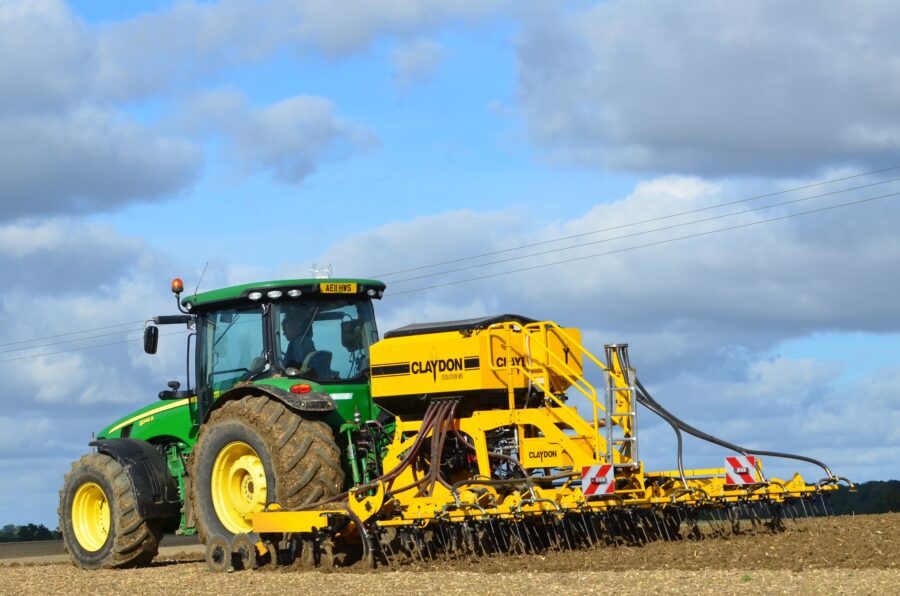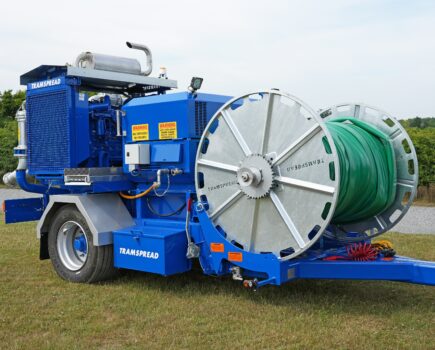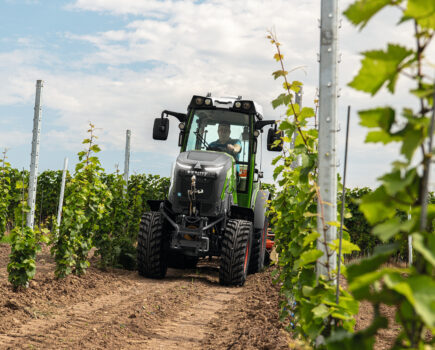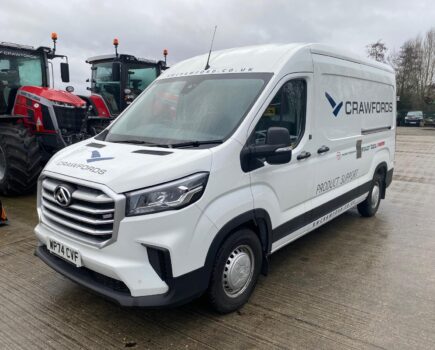European market leader in direct strip seeding technology with its Opti-Till® system, Claydon will demonstrate the latest Evolution mounted drill and TerraStar at Cereals 2023. It will also exhibit a Hybrid T4 trailed drill, 3m TerraBlade inter-row hoe and 7.5m Straw Harrow on Stand 701 at the event, which will take place at Thoresby Estate, Perlethorpe, Newark on 13th and 14th June.
It is 21 years since Jeff Claydon invented the company’s first direct strip seeding drill to dramatically reduce the cost and time involved in establishing crops on his family’s arable farm in Suffolk. Since the V Drill was launched in 2003 Claydon has continued to develop and perfect the Opti-Till® System, a holistic approach to crop establishment which delivers consistent, high yielding crops at low cost for maximum profitability, combined with progressive improvements to soil structure and health. The company has continually expanded its product range and now Claydon technology is enabling farmers all over the world to meet their commercial, environmental and sustainability objectives.
Increasingly relevant in the face of rapidly rising input costs, the Opti-Till® System is based around Claydon trailed and mounted drills from 3m to 8m wide, all of which incorporate the company’s unique leading tine technology which provides exceptional ability and versatility. The Claydon range also includes 3m, 7.5m, 9m, 12.5m and 15m Straw Harrows, the 6m TerraStar® light rotary cultivator and TerraBlade inter-row hoes from 3m to 8m wide.
Claydon products are marketed and sold to customers throughout the world, with approximately 60% of production exported to more than thirty countries, from Europe to New Zealand.
CLAYDON EVOLUTION DRILLS
Building on Claydon’s extensive experience of direct strip seeding technology, the Evolution mounted drill takes direct strip seeding to the next level. Combining enhanced operational functionality with the tried and tested features which have made Opti-Till® the crop establishment system of choice for growers wanting to reduce costs, increase productivity, and improve soil health, Evolution drills are designed for direct strip seeding, but can be used after conventional tillage, such as ploughing, following consolidation.
A key benefit of the tried and tested two-tine technology which is at the heart of every Claydon drill is its ability to cope with extremes of weather that are becoming increasingly frequent. It delivers exceptional versatility in all climatic conditions, soil types and crops, yet moves soil only in the growing zone. The front tine removes compaction, aerates the soil, and creates drainage in the rooting zone, whilst the seeding tine deposits seeds in the surface tilth. Zonal cultivation means that the previous rooting and soil structure is not destroyed, allowing worms to thrive and soil biota levels to improve.
With working widths of 3m, 4m, 4.5m, 4.8m, 5m and 6m, Evolution models incorporate 9, 13, 15 or 19 tines and most feature a 1910-litre hopper, 160-litres more than previous Claydon Hybrid mounted models. Fertiliser placement models, available with working widths of 3m and 4m, have a 2700-litre tank, an increase of 600 litres, which is split 50:50 between seed and fertiliser. The larger hoppers reduce downtime and increase output, while second and third hopper options for applying multiple types, varieties and sizes of seed are available to enhance versatility.
All models feature as standard a hydraulic fan, Artemis metering control, tramlining facility, front tine/180mm A-share configuration, double rear toolbar and road lights. Typical daily outputs range from 20ha for the 3m Evolution which requires at least 150hp to 40ha for the 6m version which needs a minimum of 300hp.
The Evolution line-up, which includes a 5m unit and 4m rigid grain/fertiliser model, incorporates new features to improve operational functionality. Seeding depth adjustment is now controlled hydraulically, improved access to the metering unit allows easier calibration, while front-mounted discs which are operated hydraulically from the tractor seat can be specified for seeding into high residue situations.
Other features include quick-fit knock-on/knock-off coulter options for the standard leading tine and A-Share to low disturbance twin disc and tine options. Multiple seed tool options allow a wide range of crops to be drilled across different soil types and situations, while the quick-change facility allows fast, easy modification when required. A large, easily accessible toolbox incorporated into the step frame is also standard.
Options include GPS variable seed rate capability, pre-emergence marker arms, front disc toolbar, stone protection, micro fertiliser applicator, low-disturbance twin tine kit, slug pelleter, blockage sensors and a light and vision kit.
The strength and rugged design of the Claydon Evolution keeps running costs to a minimum with reliable operation and minimum downtime, enabling fuel-efficient farming and low soil disturbance in all sowing scenarios, without compromising crop establishment or yields. The drill operates accurately, reliably, and inexpensively across a wide range of situations, the simple, robust, flexible design allowing it to be used in the autumn or spring to establish any crop that can be air sown.
OTHER EQUIPMENT ON SHOW
Available in in 3m, 7.5m and 9m mounted versions, together with 12.5m and 15m trailed models, the Claydon Straw Harrow achieves the high working speeds (15 to 25km/h) necessary to create a micro tilth in the top 30mm of soil, the retained moisture promoting fast, even germination of weed seeds and volunteers. Robust, and effective, it rakes out and destroys weeds at the cotyledon and one‐leaf stage, removing a food source for slugs, breaking up slug nests and desiccating their eggs by mixing up and exposing damp chaff and straw to sunlight. Typical fuel use is just two litres of fuel per hectare.
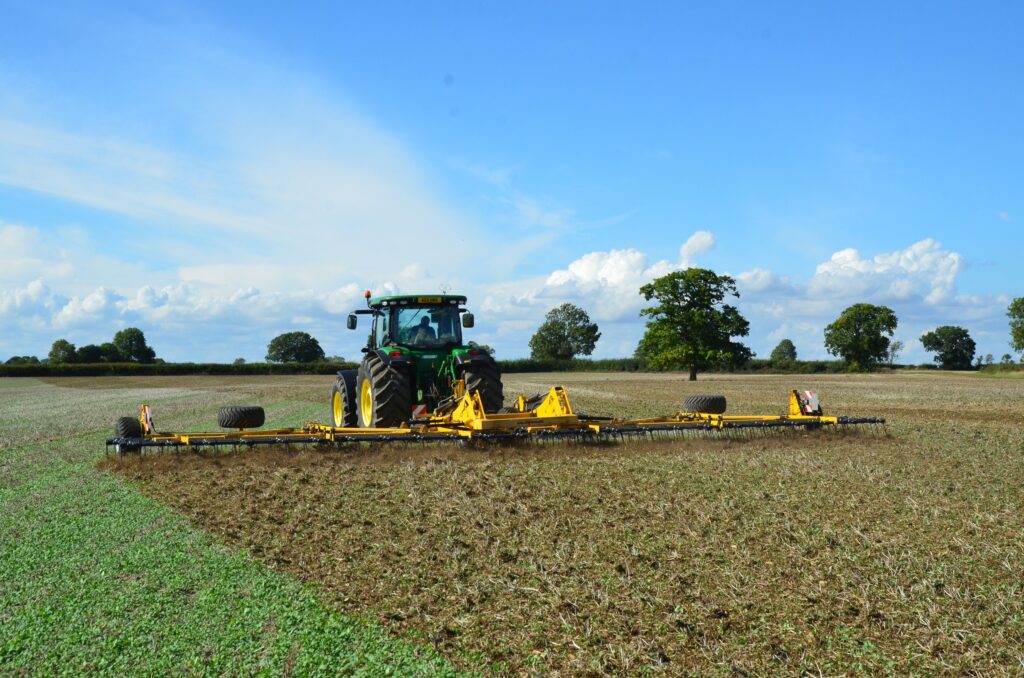
The Claydon range also includes the 6m TerraStar® light rotary cultivator for situations where the going can be harder or tougher for the Straw Harrow. Fast and effective, with minimal wearing parts for low-cost operation, it creates a shallow tilth which encourages volunteers and weeds to chit rapidly. An effective method for stubble management and slug control, the TerraStar® can also be used to level fields, improve drainage, and incorporate manures. As a mechanical weeder it reduces the need for glyphosate and by plucking divots from the top layer of soil leaves the profile undisturbed.
Claydon TerraBlade inter-row hoes from 3m to 8m wide provide a low-cost, mechanical method of controlling weeds in any band-sown combinable crops. By keeping the unseeded rows clear of farm weeds during the initial stages of crop growth, competition for nutrients, light, air, and water is reduced, allowing the young plants to grow away strong and healthy.

